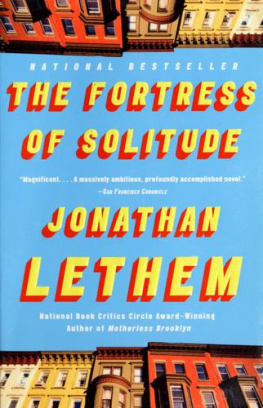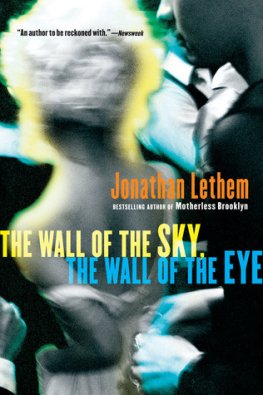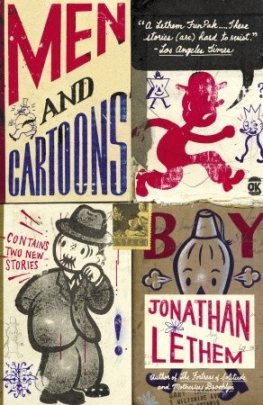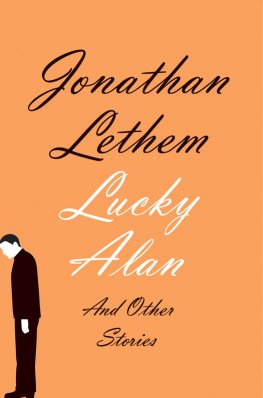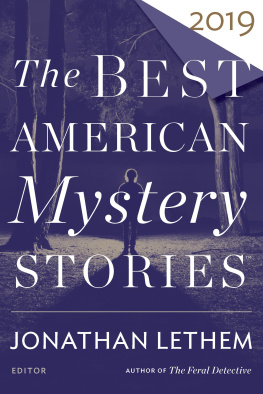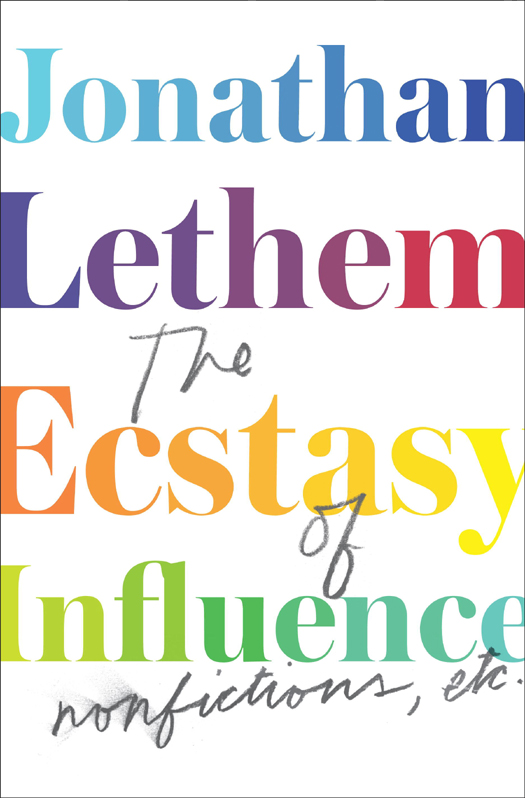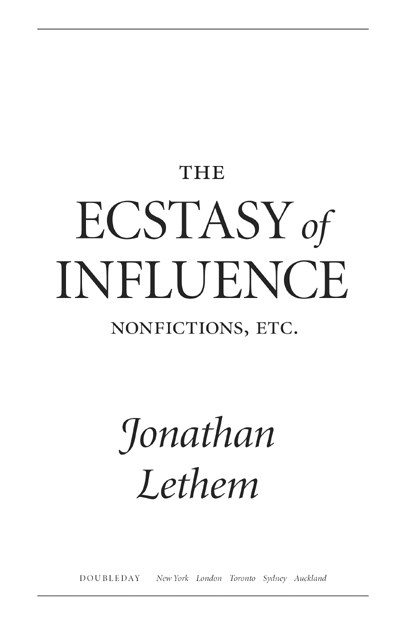ALSO BY JONATHAN LETHEM
NOVELS
Gun, with Occasional Music (1994)
Amnesia Moon (1995)
As She Climbed Across the Table (1997)
Girl in Landscape (1998)
Motherless Brooklyn (1999)
The Fortress of Solitude (2003)
You Dont Love Me Yet (2007)
Chronic City (2009)
NOVELLAS
This Shape Were In (2000)
STORY COLLECTIONS
The Wall of the Sky, the Wall of the Eye (1996)
Kafka Americana (with Carter Scholz, 1999)
Men and Cartoons (2004)
NONFICTION
The Disappointment Artist (2005)
Believeniks: The Year We Wrote a Book About the Mets
(with Christopher Sorrentino, 2006)
They Live (2010)
Crazy Friend: On Philip K. Dick (2011, Italy only)
Fear of Music (2012)
AS EDITOR
The Vintage Book of Amnesia (2000)
The Years Best Music Writing (2002)
The Novels of Philip K. Dick (Library of America, 3 vols., 20072010)
The Exegesis of Philip K. Dick (with Pamela Jackson, 2011)
Selected Stories of Robert Sheckley (with Alex Abramovitch, 2012)

Copyright 2011 by Jonathan Lethem
All rights reserved. Published in the United States by Doubleday, a division of Random House, Inc., New York, and in Canada by Random House of Canada Limited, Toronto.
www.doubleday.com
DOUBLEDAY and the portrayal of an anchor with a dolphin are registered trademarks of Random House, Inc.
Portions of this work were previously published in the following:
New and Used, Amazon.com, Rolling Stone, Brick, Crank, New York Times Book Review, Love Letters, Harpers, Conjunctions, The Novelists Lexicon, Playboy, London Review of Books, New York Times, GQ, New York Times Sunday Magazine, McSweeneys, Nerve, AnOther Magazine, a catalog of Fred Tomasellis paintings, intro, Ambit, Granta, Cabinet, Mortification, Powells website, The Guardian, Open Letters, Black Clock, Village Voice, The Believer, Brooklyn Was Mine, Lit, Bold Type, Guilt and Pleasure, Tar Magazine.
Jacket design by Ben Wiseman
Library of Congress Cataloging-in-Publication Data
Lethem, Jonathan.
The ecstasy of influence : nonfictions, etc. / by Jonathan Lethem. 1st ed.
p. cm.
I. Title.
PS3562.E8544E27 2011
814.54dc22
2011016248
eISBN: 978-0-385-53496-3
v3.1
For Richard Parks
The Artists sense of truth. Regarding truths, the artist has a weaker morality than the thinker. He definitely does not want to be deprived of the splendid and profound interpretations of life, and he resists sober, simple methods and results. Apparently he fights for the higher dignity and significance of man; in truth, he does not want to give up the most effective presuppositions of his art: the fantastic, mythical, uncertain, extreme, the sense of the symbolic, the overestimation of the person, the faith in some miraculous element in the genius. Thus he considers the continued existence of his kind of creation more important than scientific devotion to the truth in every form, however plain.
FRIEDRICH NIETZSCHE , Human, All Too Human
The idea of art as an expensive hunk of well-regulated area, both logical and magical, sits heavily over the talent of every modern painter
MANNY FARBER , White Elephant vs. Termite Art
You must have made inconceivable promises, unsupportable by facts, in your ardor, and that counted for something, and were you asked to hold to them, or were you not?
ANDER MONSON , The Essay Vanishes
Contents
White Elephant and Termite Postures in the
Life of the Twenty-first-Century Novelist
Preface
1. Undressing Me, Addressing You
SomewhereI cant find it nowtheres a book with a preface in which a writer of fiction admitted he couldnt write the preface to the book you now hold in your hands until hed conceived of the preface as a story about a writer of fiction writing a preface; only then could he begin. Saying this, the reader of said preface was presumably drawn into an awareness that the voices in so-called nonfictions were themselves artful impostures, arrangements of sentences (and of the implications residing behind the sentences) that mimicked the presence of a human being offering sincerely intended and honestly useful guidance into this or that complicated area of human thought or experience. According to this belief, even an auto manual or cookbook possessed an implied author.
Sure, you say, tell me something I dont know. But lets keep in mind that the opposite belief flourishesi.e., that we all possess the capacity and therefore also the responsibility to testify out of some unmediatedly true self. Or, if mediation goes on, that its of as little importance as the jotting hand of various forgotten human scribes who happened to capture Gods words when they authored the Bible. This belief is clung to with a ferocity that suggests something immense might be at stake.
But Ive introduced a confusion, even at the outset of this long test of your patience. That writer I mention isnt me, or even me. HesI just remembered thisan American science-fiction writer named Robert Sheckley (19282005). Sheckleys description works for me, though. Ive never managed a routine book review, let alone an essay I thought worth reprinting, without first having to invent a character whod be issuing the remarks the essay would subsequently record, and also figuring out what motivations this guycall him Lethemwould have for working his thoughts into language. By practical necessity Im firmly in the doubting-nonfiction-is-exactly-possible camp, Lethem typed insouciantly.
The reader of the preface is a fiction, too. No, no, wait, I dont for crissakes mean you, dear fleshly friend, semi-loyal eyeball. Hey, I clasp your hand. (A knowledge that people live close by is, / I think, enough. And even if only first names are ever exchanged / The people who own them seem rock-true and marvelously self-sufficient.John Ashbery, The Ongoing Story) Im not looking to try to persuade you that youre a cyborg, mosaic, site, interface, or any other post-human thing. My point is more that youre prehuman, actually: Im addressing you before youve been quite willing to appear, pretending youve arrived in order to have someone to gab with until you get here, painting your portrait to find out what you look likeonly sometimes, often, you wont sit still.
Example: The odd fact is that naming Sheckley as a science-fiction writer cost me some discomfort, but an extremely familiar and tolerable form of discomfort, one I routinely self-inflict for the useful friction it generates in the conversation into which Ive tossed the term. You, postulated readers: Arent you now divided into two teams, those appalled with me for being dodgy about Sheckley and his affiliations, and those disgruntled because they didnt know, or want to know, his name? Have a look at yourselves, on either side of the room, like tweens at a dance party: Shouldnt one or the other gender be exiting the floor about now? But stay.


